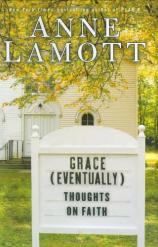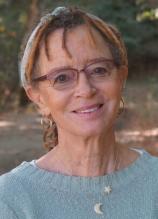Interview: April 6, 2007
April 6, 2007
Anne Lamott's writing is witty, often profane and deeply authentic. In GRACE (EVENTUALLY) she continues in the vein of TRAVELING MERCIES and PLAN B, chronicling her life as a Christian, liberal, parent and friend. As she embarks on her latest book tour, Bookreporter.com's Cindy Crosby chats with Lamott about middle age, living with a teenager, her new mellow outlook on life and what she considers the greatest joy of all.
Bookreporter.com: Some of the hilarious moments in GRACE (EVENTUALLY) deal with aging, including the phrase "the fanny pack of menopause." What's the most difficult thing about getting older for you? What do you like the most?
Anne Lamott: The worst and most embarrassing part is the worsening memory. Serious senior moments happen more and more often - and I am only 52. I don't love the bad back or the blurry vision, but for the most part, I have been incredibly blessed with my health.
I love so much about being older --- it's much easier. So much of the old self-consciousness falls away. I used to care about so much stupid stuff. Now, I toss it out of the plane because it keeps me flying too low.
BRC: You mention in the chapter "Cheese Love" that you used to be angry that your mother had given you such a "lousy owner's manual" for life. What have you tried to put in your 17-year-old son Sam's "owner's manual?"
AL: I have tried to teach Sam that there is nothing outside of his own being that can fill the God-shaped holes we all have in us --- that you can't achieve enough, own or lease enough, date the right person or whatever, to feel complete. Self-love and respect, goodness, service, community - those are the only things that help us not feel so empty or so crazy.
Also, I've taught him that we are not in control of all that much --- and that if you want to make God laugh, tell Her your plans.
BRC: In one of my favorite chapters, "Wailing Wall," you write that "anger is good, a bad attitude is excellent, and the medicinal powers of shouting and complaining cannot be overestimated." Unpack this for us --- and also tell us what this means for you living with a teenager.
AL: Anger and grief are two emotions that people tell us not to have --- but they are actually so important to our health, and our ability to be human, humane and alive. I was really damaged by my parents' insistence that good girls not raise their voices; and also, by how shaming they were about crying and being sad. So I insist on the right to be angry, sad, messy, screwed up --- whatever is my truth. I don't abuse people, I don't wallow, but I don't pretend that I have gotten over the loss of someone I love, before I actually have begun to.
As for living with a teenager: there is appropriate anger, and there is hormonally-driven teenage unpleasantness, which must be tolerated for very long or it damages the teenager and the family; also, the pets, who are very sensitive.
BRC: In what may be one of the most controversial chapters of your book, you write about helping a terminally-ill friend die. How does this fit in with your faith?
AL: It took a whole chapter to discuss this, so I can't really recapture it in a nutshell, but my heart and soul told me that this friend was in dire straights, physically and emotionally, was not going to be able to turn to Hospice, which would have been the best thing, and needed me to help him put himself to sleep. He and his wife were very dear friends. I am still extremely close to his widow, and in the depth of my friendship for them, I felt that I could do this one thing they both longed for.
BRC: I loved the last sentence in "Dance Class" --- "These are the words I want on my gravestone: that I was a helper, and that I danced."
AL: Much of the happiness we find on earth comes from helping others, as much comes from singing and dancing and playing and practicing radical silliness. So how amazing to find pursuits where both activities happen at the same time.
And then there is the greatest joy of all: reading a good book in bed.
BRC: One reviewer notes that in GRACE (EVENTUALLY) you are mellower than in past books. I found this interesting, in light of your straight talk about assisted suicide and reproductive rights for women. Do you consider yourself mellower than in years past?
AL: Yes, I am definitely mellower. I was very angry and frightened by the Bush administration, especially the war in Iraq, when I wrote PLAN B. My definite intention was to try and help people keep the faith during those years --- and to keep their senses of humor, and not give up on God or progressive politics.
BRC: You quote Kathleen Norris in your book: "Prayer is not asking for what you think you want, but asking to be changed in ways you can't imagine." In what ways do you still want to be changed?
AL: I still work hard on learning to be present in the moment, as much as possible. I have to work REALLY hard to let go. Letting go, releasing people to their own consequences and to the care of their own Higher Powers (i.e., not me) is the toughest stuff, and where I would most love to continue changing.
BRC: You mention in GRACE (EVENTUALLY) that you were a "lifelong reading girl" and you were "saved by stories" as a child. What do you read now for pleasure? What authors have informed your writing?
AL: Right now I am immersed in poetry --- Mary Oliver, Sharon Olds, Mark Doty. When I was a young writer, I was so motivated and inspired by Ann Beattie, Nora Ephron, John Updike, Jane Austen and George Eliot.
BRC: Some reviewers have criticized GRACE (EVENTUALLY) because you stick closely to the format (and even front jacket images) of TRAVELING MERCIES: Some Thoughts on Faith and PLAN B: Further Thoughts on Faith. What would you like to say to them?
AL: They get to say whatever they want. The books are so distinct to me; obviously, the covers are similar for a reason, as the three books are all essays on faith. I'm an essayist covering one small family during 20 or so years, and I write about the small moments of grace and awakening that occur amidst the darkness of the political realm, and surviving life with a teenager, my own aging, losing parents, losing faith, losing pets.
I haven't actually seen any bad reviews --- so don't spoil it for me!
BRC: Your friend, Father Tom, gave you this advice: "Get outdoors as much as you can" to find God. How has this influenced you?
AL: I have spent well over half of my life outside. I think he was trying to help me through a specific situation where I was sitting inside, brooding, my mind orbiting around itself. So it's the same advice I give people all the time: Go for a walk. Look up!
BRC: With GRACE (EVENTUALLY) just hitting the bookstores, have you thought about what you'll be writing next? Or are you just enjoying publication? Come to think of it, do you enjoy publication?
AL: I honestly do not know what I will write now, but I know I will not get any real work done on anything until a month or so after publication. A large part of me wants to write a novel, but that takes a great deal of stamina, much more than non-fiction, so I have to wait and see where I am physically in the late spring.
I hate publication. It is me at my most worried and neurotic.
BRC: You've just embarked on a long book tour. Do these tours energize you, or deplete you?
AL: I love speaking before crowds, I love what I see as my missionary work in the large community, helping people find their way back to faith, helping them get started on the novels or memoirs they have always wanted to write. But I hate flying. I do not believe in it, conceptually. It is very hard to be on the East Coast for a week, even though I totally love each of the cities I visit --- but I get terrible jet-lag, am not a good sleeper, and my body has become so much less forgiving. Ten years ago, I could get by on five hours sleep. Now, I feel like I should go to the Emergency Room.
BRC: You write, "I am forty-eleven now, sober twenty years." Where do you see yourself in the next twenty?
AL: God, I don't know where I see myself in ONE year. I really love my life, my son, my church, my guy, my family, my pets, my favorite hiking places. I live a plain and simple life, so I look forward to more of the same. And it would all be so much easier if my mind didn't want to go EVERYWHERE with me. Oh well.




